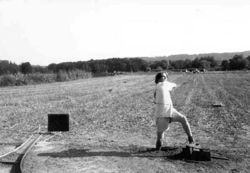Hornussen

 Stopping the hornuss in flight | |
| Presence | |
|---|---|
| Country or region | Switzerland |
| Olympic | No |
| Paralympic | No |



Hornussen is an indigenous Swiss sport. The sport gets its name from the puck which is known as a "Hornuss" (hornet) or "Nouss". When hit, it can whizz through the air at up to 300 km/h (186.4 mph) and create a buzzing sound.[1][2]
Together with Schwingen and Steinstossen, Hornussen is seen as a Swiss national sport. Outside of Switzerland, there are only a few teams.
History
[edit]The sport probably developed in the seventeenth century. The earliest reference to Hornuss is found in the records of 1625 of the consistory of Lauperswil, canton Bern, in a complaint about the breaking of the Sabbath. Two men were fined the sum of 20 francs for playing Hornussen on Sunday. The first recorded competitive Hornussen game occurred in 1655 in Trub.[1] The sport appears in the 1841 Jeremias Gotthelf novel Uli, der Knecht.[3] In the 19th century this amateur sport was very popular in the Emmental and in Entlebuch.
In 1902, the federal Hornussen association was founded, which organises a competition every three years. In 2011, there were around 270 clubs in the association, with around 8,300 members.[1] During the season inter-association and inter-cantonal events are held, as well as group and elite events.
In 2012, the international Hornussen association was founded, which helps promote the sport in countries throughout the world. Since its founding, more than 20 clubs have been founded in the United States.
Gameplay
[edit]A game of Hornussen is played between two teams, each composed of between 16 and 20 players, that take turns in hitting the 78 g (2.8 oz) Nouss from the "Bock" and defending the trapezoidal playing field called Ries. The "Ries" begins 100 m (330 ft) from the "Bock" and is 180 m (590 ft) deep. Initially 8 m (26 ft) wide, it widens to 14 m (46 ft) at the far end.[3] A pair of turns, one at the Bock and one in the Ries by each team forms a Durchgang ("transition"), analogous to an innings in sports such as baseball or cricket. A normal championship game is made up of two transitions, special events (such as the regional or inter-cantonal tournaments in autumn) might be different.
When playing from the Bock, each team member has to hit the Nouss twice per transition, for four hits in total. The further the Nouss flies in the Ries, the more points the player gets. The count starts at 100 meters, measured from the bock, and adds one point for every ten additional meters.[4] The task of the defending team is to spot the Nouss in the sky and prevent it from touching the ground in the Ries by using a Schindel (shingle). Each Nouss which lands in the Ries awards one penalty point to the defending team.[5]
In the end, the team with the fewest penalty points wins the game. If the two teams are tied (which happens often), the points of each player are added to form the team total. In this case, the team with the most points wins. Aside from the team score, each player is ranked according to his or her personal total from the four hits. At the end of the season, the best players are rewarded.
References
[edit]- ^ a b c "Hornussen - Where the Nouss flies from the ramp and into the playing field". MySwitzerland.com.
- ^ "Hornussen - Living traditions". lebendigetraditionen.ch. Archived from the original on 2017-03-06.
- ^ a b Swiss National Sports in German, French and Italian in the online Historical Dictionary of Switzerland.
- ^ "Schlagen – Eidgenössischer Hornusserverband". ehv.ch (in German). Retrieved 2019-09-09.
- ^ "Abtun – Eidgenössischer Hornusserverband". ehv.ch (in German). Retrieved 2019-09-09.